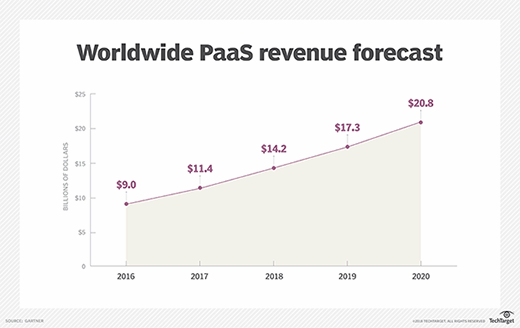
apops - Fotolia
Look beyond public cloud giants for the right PaaS offering
While the leading public cloud vendors remain a popular choice for PaaS, there are other offerings, ranging from Heroku to Engine Yard, that might be worth a closer look.
When an enterprise looks to incorporate platform as a service into its development strategy, it's likely to gravitate toward an offering from one of the "big three" public cloud vendors: AWS with Elastic Beanstalk, Microsoft with Azure App Service and Google with App Engine. But dev teams shouldn't stop the search there.
In fact, if you evaluate PaaS alternatives to AWS, Azure and Google, you might find one that better suits your needs. A PaaS offering is usually quick to install and experiment with in a sandbox environment, so use that as an opportunity to find the model that works best for you.
In the meantime, here are some alternative PaaS options, other than the big three, to think about.
IBM Cloud
The PaaS offering within the IBM Cloud portfolio, formerly known as Bluemix, is based on Cloud Foundry's open source technology. It runs on IBM's cloud infrastructure and is available as either a private or public PaaS environment. The private option enables you to host Cloud Foundry PaaS within your own data center. In this scenario, you have all the benefits of a cloud-based platform, as well as the independence and security that come with the use of your own infrastructure.
IBM PaaS is quick to deploy -- I timed it at nine minutes -- and enables you to work with other open source platforms, such as MongoDB, Node.js and OpenStack.
For larger enterprises, and especially those with mainframes, IBM Cloud, in general, might be a natural fit.

Salesforce Heroku
Salesforce is known mostly as a SaaS provider, but it also has a PaaS offering in Heroku, which it acquired in 2010. The platform lets you deploy and manage applications with frameworks such as Ruby, Node.js, Java, Python and PHP. Heroku is available in a few different versions, including the Enterprise edition, which comes with a 30-minute service-level agreement, 24/7/365 support and more granular controls. The Private Spaces version, designed to let you more securely connect your applications and protect sensitive data, provides network isolation and a dedicated runtime environment.
Heroku has an intuitive and user-friendly web interface -- a feature that's especially important to new developers. For those with more experience, it offers a solid command-line interface.
Red Hat OpenShift
One of the biggest benefits of OpenShift is that it's driven by the maturity of Red Hat Enterprise Linux. It also integrates with Red Hat's OpenStack-based infrastructure as a service and comes in three different models:
- OpenShift Online runs in the public cloud, including on AWS, and offers a container platform that's based on integrated Docker containers and Kubernetes;
- OpenShift Dedicated provides you with a private OpenShift cluster that Red Hat operates; and
- OpenShift Container Platform allows you to deploy OpenShift in your own data center or private cloud.
There is also OpenShift.io, an open source technology that supplements OpenShift Online with machine learning, analytics and other services.
OpenShift supports multiple languages, including Java, .NET, Node.js, Python, Ruby and Perl. For database services, it supports MariaDB, MongoDB, MySQL, PostgreSQL and Redis. The platform can also work with integrated development environments, such as Eclipse, Red Hat JBoss Developer Studio and Titanium Studio.
In addition, Red Hat just acquired CoreOS, which expands its Kubernetes and container portfolio.
CenturyLink AppFog
CenturyLink entered the PaaS market through its 2013 acquisition of AppFog. The service supports Java, Python, Node.js, PHP, Ruby, MySQL, MongoDB and PostreSQL. AppFog is based on Cloud Foundry, which speaks to its maturity and means you can more easily migrate your applications from any other Cloud Foundry-based platform. This open source nature is, in general, one of the advantages of using a PaaS offering that's not based on a proprietary cloud platform.
I've found AppFog to be developer-friendly, and it's driven by Agile software principles.
Engine Yard
Built on Ruby on Rails and designed to deploy and run Rails applications in the cloud, this PaaS offering uses AWS as its back end. Engine Yard offers database support for MySQL and PostgreSQL and is well-known for its global customer support, as well as its 24/7 app monitoring service. If the backbone of your company is Rails, this PaaS offering might be a top choice.







